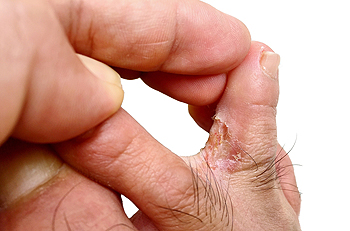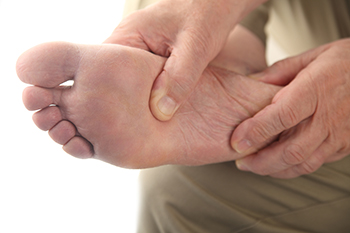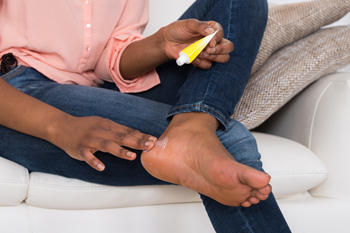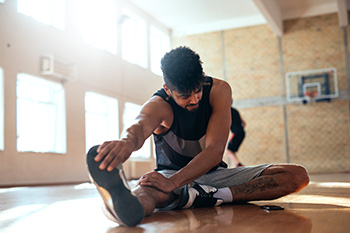April 2023
Athlete’s Foot and the Hands

Athlete’s foot is a relatively well-known fungal infection that commonly affects the feet. This highly contagious foot condition, called tinea pedis, can be spread by walking around barefoot in warm, moist environments where the fungal infection thrives. Many patients wonder whether the feet are the only areas of the body that can be impacted by this foot condition. The answer is that the fungal infection might also spread to the hands in certain special cases. When this occurs, this is known as tinea manuum. When this occurs in a patient, they might notice similarities between the symptoms experienced in the hands and the feet. This is one reason why it might be prudent to wash the hands immediately after touching feet infected by athlete’s foot. If you are someone that is currently living with athlete’s foot, it is highly suggested that you contact a podiatrist before it spreads to other parts of the body.
Athlete’s foot is an inconvenient condition that can be easily reduced with the proper treatment. If you have any concerns about your feet and ankles, contact Dr. Ronald K. Olm from Grand Traverse Foot & Ankle Center. Our doctor will treat your foot and ankle needs.
Athlete’s Foot: The Sole Story
Athlete's foot, also known as tinea pedis, can be an extremely contagious foot infection. It is commonly contracted in public changing areas and bathrooms, dormitory style living quarters, around locker rooms and public swimming pools, or anywhere your feet often come into contact with other people.
Solutions to Combat Athlete’s Foot
- Hydrate your feet by using lotion
- Exfoliate
- Buff off nails
- Use of anti-fungal products
- Examine your feet and visit your doctor if any suspicious blisters or cuts develop
Athlete’s foot can cause many irritating symptoms such as dry and flaking skin, itching, and redness. Some more severe symptoms can include bleeding and cracked skin, intense itching and burning, and even pain when walking. In the worst cases, Athlete’s foot can cause blistering as well. Speak to your podiatrist for a better understanding of the different causes of Athlete’s foot, as well as help in determining which treatment options are best for you.
If you have any questions please feel free to contact one of our offices located in Traverse City and Kalkaska, MI . We offer the newest diagnostic and treatment technologies for all your foot and ankle needs.
Foot Problems Common to Diabetics

Foot problems are relatively common among those with diabetes. Over time, diabetes can cause neuropathy, a type of nerve damage. It can interfere with feeling in the feet and cause tingling and pain. With the loss of feeling in the feet, one can get a blister or sore on their foot that gets infected or does not heal properly and never know about it. Also, diabetes can lower the amount of blood flow to the feet, making it harder for sores or infections to heal. Unfortunately, improper healing in diabetics could lead to gangrene and limb loss. Management of blood glucose levels and daily foot care can help to prevent diabetic-related foot problems. Things you can do each day to care for your feet include washing, drying, and moisturizing them, examining your feet for any sores or abnormalities, and trimming toenails straight across. If you have diabetes, it is strongly suggested that you have a podiatrist on your healthcare team and receive regular examinations of your feet.
Diabetic foot care is important in preventing foot ailments such as ulcers. If you are suffering from diabetes or have any other concerns about your feet, contact Dr. Ronald K. Olm from Grand Traverse Foot & Ankle Center. Our doctor can provide the care you need to keep you pain-free and on your feet.
Diabetic Foot Care
Diabetes affects millions of people every year. The condition can damage blood vessels in many parts of the body, especially the feet. Because of this, taking care of your feet is essential if you have diabetes, and having a podiatrist help monitor your foot health is highly recommended.
The Importance of Caring for Your Feet
- Routinely inspect your feet for bruises or sores.
- Wear socks that fit your feet comfortably.
- Wear comfortable shoes that provide adequate support.
Patients with diabetes should have their doctor monitor their blood levels, as blood sugar levels play such a huge role in diabetic care. Monitoring these levels on a regular basis is highly advised.
It is always best to inform your healthcare professional of any concerns you may have regarding your feet, especially for diabetic patients. Early treatment and routine foot examinations are keys to maintaining proper health, especially because severe complications can arise if proper treatment is not applied.
If you have any questions please feel free to contact one of our offices located in Traverse City and Kalkaska, MI . We offer the newest diagnostic and treatment technologies for all your foot and ankle needs.
Cleaning Cracked Heels

Cracked heels are an unsightly condition of the foot where excessive dehydration causes the skin at the back of the heel to become severely dry. As a result, the skin at the back of the heel may crack or fissure. Sometimes, an individual with a bad case of cracked heels might notice that their heels look dirty. This might be because dirt or debris can get trapped between the skin cracks. When the dirt builds up, this can give the appearance of gray lines on the back of the heels. If you are suffering from cracked heels, then it is suggested that you schedule an appointment with a podiatrist. This foot health specialist will be able to treat your condition and answer any questions that you might have about dirt building up in cracked heels.
Cracked heels are unsightly and can cause further damage to your shoes and feet. If you have any concerns, contact Dr. Ronald K. Olm from Grand Traverse Foot & Ankle Center. Our doctor can provide the care you need to keep you pain-free and on your feet.
Cracked Heels
Cracked heels appear unappealing and can make it harder for you walk around in sandals. Aside from looking unpleasant, cracked heels can also tear stockings, socks, and wear out your shoes. There are several methods to help restore a cracked heel and prevent further damage.
How Do You Get Them?
Dry skin is the number one culprit in creating cracked heels. Many athletes, walkers, joggers, and even swimmers suffer from cracked heels. Age and skin oil production play a role to getting cracked heels as well.
Promote Healing
Over the counter medicines can help, especially for those that need instant relief or who suffer from chronic dry feet.
Wear Socks – Wearing socks with medicated creams helps lock in moisture.
Moisturizers – Applying both day and night will help alleviate dryness which causes cracking.
Pumice Stones – These exfoliate and remove dead skin, which allows for smoother moisturizer application and better absorption into the skin.
Change in Diet
Eating healthy with a well-balanced diet will give the skin a fresh and radiant look. Your body responds to the kinds of food you ingest. Omega-3 fatty acids and zinc supplements can also revitalize skin tissue.
Most importantly, seek professional help if unsure how to proceed in treating cracked heels. A podiatrist will help you with any questions or information needed.
If you have any questions, please feel free to contact one of our offices located in Traverse City and Kalkaska, MI . We offer the newest diagnostic and treatment technologies for all your foot care needs.
Successful Running Injury Prevention Tactics

Preventing running injuries is crucial in maintaining good form and completing running goals. When the body is strong, running injuries may be avoided. Many people understand the importance of running correctly and training to get the body accustomed to running. Most runners enjoy having a goal that can range from running a few miles on the weekend to practicing to run a marathon. It is important to warm up and cool down before and after running to help prevent running injuries. If you would like to know how running injuries affect the feet as well as learn about successful prevention strategies, it is suggested that you confer with a podiatrist.
All runners should take extra precaution when trying to avoid injury. If you have any concerns about your feet, contact Dr. Ronald K. Olm of Grand Traverse Foot & Ankle Center. Our doctor will treat your foot and ankle needs.
How to Prevent Running Injuries
There are a lot of mistakes a runner can make prior to a workout that can induce injury. A lot of athletes tend to overstretch before running, instead of saving those workouts for a post-run routine. Deep lunges and hand-to-toe hamstring pulls should be performed after a workout instead of during a warmup. Another common mistake is jumping into an intense routine before your body is physically prepared for it. You should try to ease your way into long-distance running instead of forcing yourself to rush into it.
More Tips for Preventing Injury
- Incorporate Strength Training into Workouts - This will help improve the body’s overall athleticism
- Improve and Maintain Your Flexibility – Stretching everyday will help improve overall performance
- “Warm Up” Before Running and “Cool Down” Afterward – A warm up of 5-10 minutes helps get rid of lactic acid in the muscles and prevents delayed muscle soreness
- Cross-Training is Crucial
- Wear Proper Running Shoes
- Have a Formal Gait Analysis – Poor biomechanics can easily cause injury
If you have any questions, please feel free to contact one of our offices located in Traverse City and Kalkaska, MI . We offer the newest diagnostic and treatment technologies for all your foot care needs.






